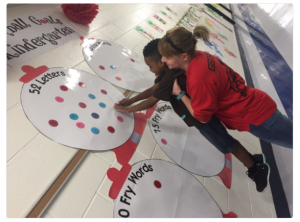I started doing research in 2008 on grading and reporting, and that research eventually led to my dissertation topic, which was titled, “Teacher and Parent Dispositions of Grading Practices in Differentiated Middle School Classrooms.” From the research I gathered, I was able to see that teachers implemented different practices, some of which were not aligned to mastery of the standards. I was also able to see that parents may not be completely involved in the learning process of the students, but parents did want to know how their children were performing in school. Parents also wanted to know what they could do to help improve their child’s abilities and mastery of standards. It’s funny to think that some of the articles and problems in grading I read back in 2008 still persist today, almost 10 years later. Even now, it leads me to ask, “What is the problem? Why can’t we get this grading thing right? Is grading really that complicated?”
I begin my narrative on grading by telling a personal story. You see, I think we can learn a lot from elementary school teachers because they understand the importance of communicating daily and weekly progress to parents. I use my son’s teacher, Ms. Peacock (and hopefully she doesn’t mind) as an example because she does a great job of communicating exactly what we need to do at home to support his learning at school. For the first two weeks of school, my wife and I knew that our son, Kameron, had to not only learn uppercase and lowercase letters, but he also had to learn the sounds of each of the letters. When Kameron mastered a letter, including recognition and it’s sounds, those letters went away, and the only thing he had to focus on in his “New Friends” folder were the letters he hadn’t mastered. We worked and worked until he finally was able to do it. It was INTENTIONAL, and it eventually led to his mastery of the letters and sounds. Ms. Peacock even helped Kameron place his name on the success wall stating that he knew all of the 52 letters. How awesome is that!

I tell this story because it made me wonder what this looks like in middle school. This year, we had our teachers create a grading and assessment plan for the students. This grading plan goes home before the unit begins, and it gives a clear indication of what will go in the gradebook and how it will affect the child’s grades. Not only that, these plans give parents a good understanding of what their children need to do to be successful, and it gives them an overview of the support the children will need as they work to progress through the unit. As a leader, it helps to keep check on what students should know and what teachers are doing to help those students meet their goals.
Grading and reporting is a complex issue, but it doesn’t have to be. Planning is the most important part; there will always be students who meet the standard, students who almost meet the standard, and student who just don’t get it. As a teacher, one has to plan for each of these groups of students to ensure success and mastery of the standard. Grades are important because they communicate student progress to parents, but if mastery is the goal, this ongoing cycle of mastery, near mastery, and remediation must always be prevalent in the classroom.
Through observation and research, I’ve come to the conclusion that many teachers are unsure how to create and report grades that are accurate. Not only that, many teachers are unsure of what to do when students don’t understand concepts. How are buffer weeks used to remediate students? How does one implement a plan for redos and retakes accurately? How does one use differentiated instruction to continue to help students progress towards learning goals? All of these are questions that resonate around the experience of accurate, reporting of grades.
Over the next few weeks, I plan to take on the task of helping teachers and leaders develop plans that will help report grades to stakeholders in an accurate way. We will explore common misconceptions and practices that lead teachers away from mastery. We will also explore ways teachers can get back on track with their grading practices, and I’ll show how fixing some minor thoughts and practices can help students reach their goals. I will share some research from some experts in the field of grading and differentiated instruction, including Rick Wormeli, Thomas Guskey, Douglas Reeves, Carol Ann Tomlinson, etc. I understand that this is a huge task, but I am willing to take on the challenge because grading and reporting is an essential component of providing students with the support that they need. I look forward to sharing with all of you, and I hope that you are willing to go through this experience to not only become a better educator, but also to change and refine thought processes around grading, reporting, and differentiation. I’m convinced that this will make a difference. I look forward to it.
With #2185Pride,
Dr. Gardner